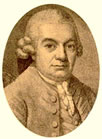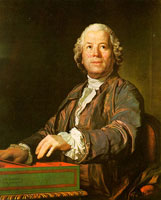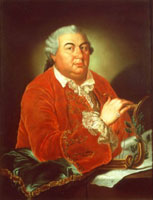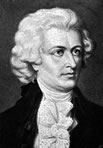classical (1750 - 1810)
Carl Philipp Emanuel Bach
 Of all the Bach children, C. P. E. Bach came closest to escaping the shadow of his father, the incomparable J. S. Bach. In fact, during the late eighteenth century, the younger Bach was actually better known than the elder. This situation was not to last, however; the revival of J. S. Bach’s music was in full swing by the early 1800s, while C. P. E. Bach was sinking into obscurity. It was not until very recently that C. P. E. Bach’s music, particularly the highly individual and varied music for keyboard, was rediscovered.
Of all the Bach children, C. P. E. Bach came closest to escaping the shadow of his father, the incomparable J. S. Bach. In fact, during the late eighteenth century, the younger Bach was actually better known than the elder. This situation was not to last, however; the revival of J. S. Bach’s music was in full swing by the early 1800s, while C. P. E. Bach was sinking into obscurity. It was not until very recently that C. P. E. Bach’s music, particularly the highly individual and varied music for keyboard, was rediscovered.
Domenico Cimarosa
Though certainly not as famous today as some of his contemporaries, including W.A. Mozart and Antonio Salieri, in his time Domenico Cimarosa was both celebrated and handsomely rewarded for his works. When he replaced Salieri as kapellmeister at the court of Leopold II, for instance, the emperor bestowed on him today’s equivalent of $450,000. It was shortly thereafter that Cimarosa completed what has become his most famous work, Il matrimonia segreto, at the second performance of which the emperor (who was seeing it for the first time), ordered it repeated in its entirety that same night. In his delight with the new opera, Leopold II also gave the composer what would now be approximately $75,000.
Christoph Willibald Gluck
 Christoph Willibald Gluck was an opera composer who tried his hand at almost all of the operatic genres of his day. He is probably most famous for his first two “reform operas” (Orfeo ed Euridice and Alceste) and the debate that they engendered. Debate aside, his works, especially his reform operas, continued to influence composers for several generations. His famous student, Antonio Salieri, benefited from Gluck’s teachings in his own well-received operas, and, as Salieri mentored famous composers such as Beethoven, Schubert and Liszt, Gluck’s legacy was indeed substantial.
Christoph Willibald Gluck was an opera composer who tried his hand at almost all of the operatic genres of his day. He is probably most famous for his first two “reform operas” (Orfeo ed Euridice and Alceste) and the debate that they engendered. Debate aside, his works, especially his reform operas, continued to influence composers for several generations. His famous student, Antonio Salieri, benefited from Gluck’s teachings in his own well-received operas, and, as Salieri mentored famous composers such as Beethoven, Schubert and Liszt, Gluck’s legacy was indeed substantial.
Franz Joseph Haydn
 It is well known that Franz Joseph Haydn’s most famous colleague, Wolfgang Amadeus Mozart, died in poverty. The exact location of his grave still remains a mystery. Haydn’s case is completely different. When the older composer died in 1809, his fame was so great that phrenologists, seeking to discover the secret of Haydn’s genius, took the composer’s head for study. Haydn’s head traveled around Europe for 145 years until it was reunited with his body in a final interment ceremony in Eisenstadt in 1954.
It is well known that Franz Joseph Haydn’s most famous colleague, Wolfgang Amadeus Mozart, died in poverty. The exact location of his grave still remains a mystery. Haydn’s case is completely different. When the older composer died in 1809, his fame was so great that phrenologists, seeking to discover the secret of Haydn’s genius, took the composer’s head for study. Haydn’s head traveled around Europe for 145 years until it was reunited with his body in a final interment ceremony in Eisenstadt in 1954.
Niccolò Jommelli
 Although little known today, the Italian composer Niccolò Jommelli wrote some of the most remarkable operas of the mid-eighteenth century. They were admired for their blend of Italian, German, and French style, garnering praise even from Mozart.
Although little known today, the Italian composer Niccolò Jommelli wrote some of the most remarkable operas of the mid-eighteenth century. They were admired for their blend of Italian, German, and French style, garnering praise even from Mozart.
Wolfgang Amadeus Mozart
 Mozart’s death has long been a source of rampant speculation. The most widespread story is that Mozart was poisoned by his rival, composer Antonio Salieri, but there is almost no evidence for this charge. The symptoms of Mozart’s illness do not match those of any known poison, and the relationship between Mozart and Salieri was almost always a friendly one. The main evidence against Salieri is his own testimony when he lay dying in 1825, but he was suffering from senility and bouts of delirium at the time and accused himself of many unlikely crimes. In his lucid moments, Salieri vehemently denied harming Mozart.
Mozart’s death has long been a source of rampant speculation. The most widespread story is that Mozart was poisoned by his rival, composer Antonio Salieri, but there is almost no evidence for this charge. The symptoms of Mozart’s illness do not match those of any known poison, and the relationship between Mozart and Salieri was almost always a friendly one. The main evidence against Salieri is his own testimony when he lay dying in 1825, but he was suffering from senility and bouts of delirium at the time and accused himself of many unlikely crimes. In his lucid moments, Salieri vehemently denied harming Mozart.
Antonio Salieri
 Much has been made of the supposed rivalry between Mozart and Salieri, particularly since the production of Peter Shaffer’s stage play Amadeus and the subsequent Academy Award winning film. However, if such an intense rivalry did indeed exist it probably only served to drive a healthy output of compositions from the two men. There is no evidence, for instance, that Salieri poisoned Mozart or that he regularly tried to sabotage his career. Salieri was in fact a respected and successful composer in his own right. It is interesting to note that during his tenure as Hofkapellmeister at the Hapsburg court, Salieri regularly programmed masses that were written by Mozart. He also served as a pallbearer at Mozart’s funeral.
Much has been made of the supposed rivalry between Mozart and Salieri, particularly since the production of Peter Shaffer’s stage play Amadeus and the subsequent Academy Award winning film. However, if such an intense rivalry did indeed exist it probably only served to drive a healthy output of compositions from the two men. There is no evidence, for instance, that Salieri poisoned Mozart or that he regularly tried to sabotage his career. Salieri was in fact a respected and successful composer in his own right. It is interesting to note that during his tenure as Hofkapellmeister at the Hapsburg court, Salieri regularly programmed masses that were written by Mozart. He also served as a pallbearer at Mozart’s funeral.